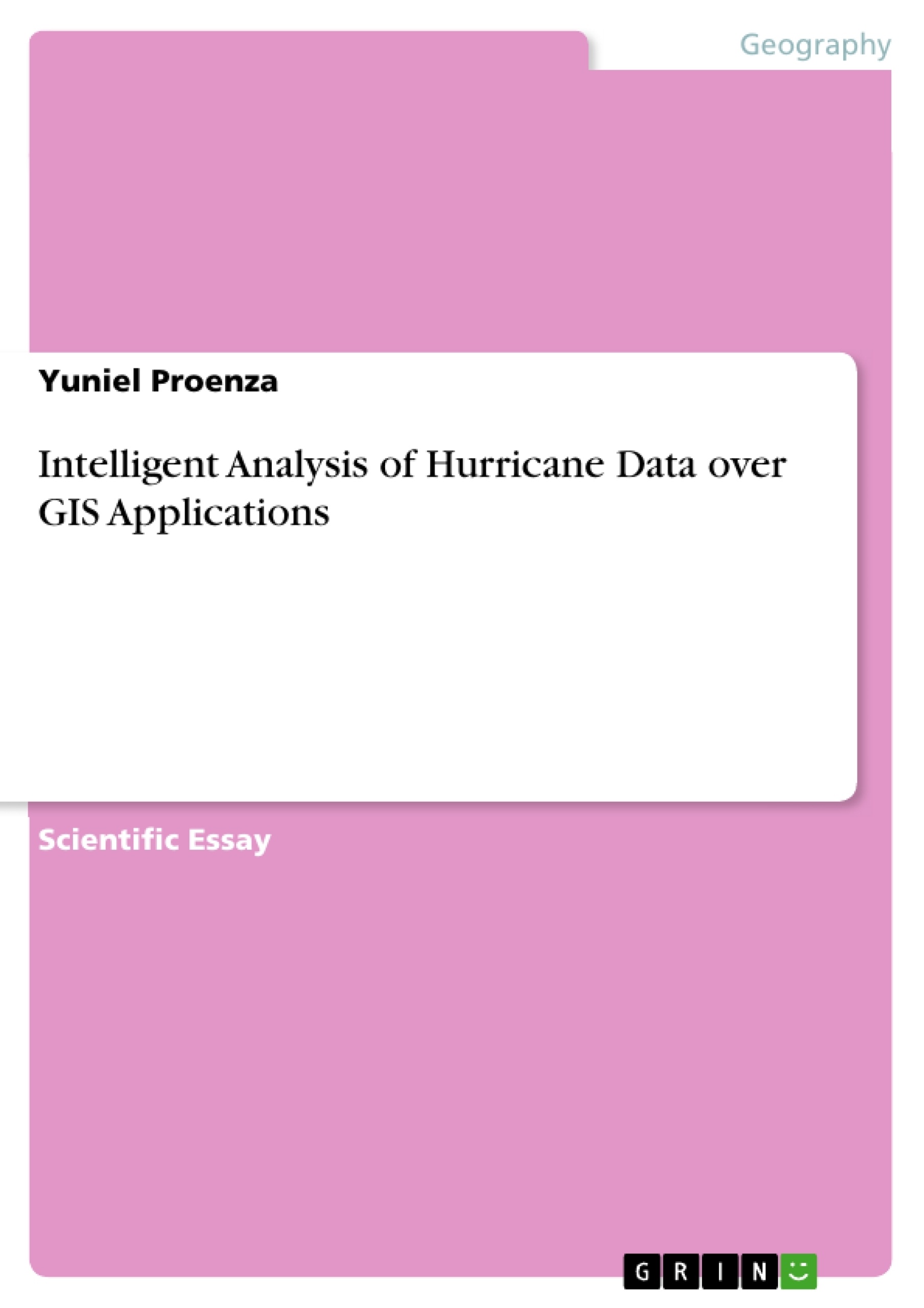Geographical Information Systems (GIS) research area have been evolving with time. Those systems have become useful beyond spatial and geographic information representation and computer aided analysis using maps.
Some of the most important fields of application for GIS are fleet control, tourism analysis and Meteorological analysis. For the last mentioned field, advisory and prediction models should be enhanced aiming the avoidance of critical damage associated to Hurricanes. Intelligent systems have become the optimal solution when decision-making situations are extreme and advanced reasoning is expected.
Existing models involve high mathematical analysis, which is complex for humans and also sometimes computational costs have to be considered. There are some artificial intelligence fields that are exploring the possibility of making inference about existing data, enriching the information and enhancing the obtained results. In the present work we propose a hybrid GIS which includes some behavioral aspects of intelligent systems for Hurricane analysis.
Inhaltsverzeichnis (Table of Contents)
- I. INTRODUCTION
- II. STATE OF THE ART.
- III. THE LAYING DATA MODEL.
- IV. REASONING OVER GIS APPLICATIONS ......
- V. CONCLUSIONS..
Zielsetzung und Themenschwerpunkte (Objectives and Key Themes)
This work aims to enhance hurricane analysis and prediction models by integrating intelligent system aspects into a hybrid GIS. The goal is to improve decision-making capabilities in extreme situations, where accurate and timely information is critical for preventing catastrophic damage.
- Hurricane Analysis and Prediction
- Intelligent Systems and Reasoning
- GIS Applications and Data Modeling
- Motion Semantics and Trajectory Analysis
- Ontology-Based Approaches
Zusammenfassung der Kapitel (Chapter Summaries)
- I. INTRODUCTION: This chapter highlights the importance of accurate hurricane analysis for preserving human lives and economic resources. It discusses the challenges of hurricane prediction, emphasizing the need for a deeper understanding of hurricane behavior and evolution. The chapter introduces the concept of semantic analysis and its relevance to hurricane modeling, particularly motion semantics, and its role in representing and reasoning about moving objects.
- II. STATE OF THE ART: This section delves into the existing research and approaches to hurricane analysis, focusing on qualitative reasoning (QR) and qualitative spatial reasoning (QSR). It explores techniques like Region Connection Calculus (RCC) and reasoning about continuous change, highlighting their potential contributions to hurricane modeling. The chapter also discusses other approaches like Qualitative Constraint Calculi (QCC) and The Hybrid Model, emphasizing their strengths and limitations in relation to hurricane analysis.
- III. THE LAYING DATA MODEL: This chapter provides a detailed explanation of the data model used in the proposed hybrid GIS, outlining its characteristics and importance for hurricane analysis. It describes how the data model facilitates the integration of intelligent system aspects and enables efficient reasoning and inference.
Schlüsselwörter (Keywords)
This research explores the intersection of GIS, hurricane analysis, intelligent systems, ontology, and movement semantics. The focus is on developing a hybrid GIS system that incorporates intelligent reasoning and inference capabilities to enhance hurricane tracking, prediction, and mitigation efforts. The study utilizes ontological models and semantic approaches for representing and understanding hurricane behavior, ultimately aiming to improve decision-making in critical situations.
Frequently Asked Questions
How can GIS be used in meteorological analysis?
Geographical Information Systems (GIS) go beyond simple mapping; they allow for advanced spatial analysis, representation of hurricane trajectories, and integration of predictive models.
What is the role of Artificial Intelligence in hurricane prediction?
AI and intelligent systems help in making inferences from complex data, enriching information, and enhancing reasoning in extreme decision-making situations where traditional mathematical models are too slow or complex.
What is "motion semantics" in the context of GIS?
Motion semantics involves the study and representation of how objects move through space over time, which is crucial for understanding the behavior and evolution of hurricanes.
What is a "hybrid GIS"?
A hybrid GIS combines traditional spatial data representation with behavioral aspects of intelligent systems to allow for automated reasoning and better prediction results.
How does qualitative spatial reasoning (QSR) contribute to hurricane analysis?
QSR allows for reasoning about continuous changes and region connections (like RCC) without needing exact coordinates at every step, simplifying the computational cost of tracking moving weather systems.
- Citation du texte
- Proff. Yuniel Proenza (Auteur), 2016, Intelligent Analysis of Hurricane Data over GIS Applications, Munich, GRIN Verlag, https://www.grin.com/document/345132



